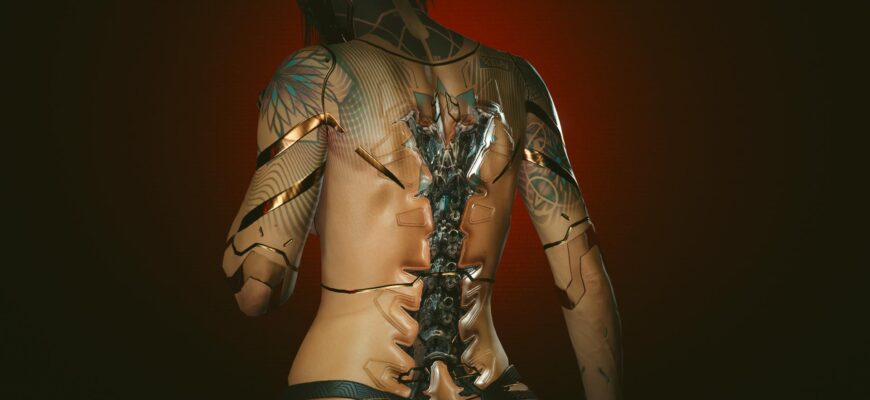In the often-unfiltered world of online streaming, opinions are rarely held back. Recently, Ukrainian streamer Vitaliy “Papich” Tsal, known for his strong views and distinctive commentary, stirred a fresh wave of discussion. His latest tirade targeted not only the dystopian aesthetics of the game Cyberpunk 2077 but also extended to a scathing critique of modern women`s affinity for tattoos and cosmetic enhancements.
The Cybernetic Dystopia of Night City Through Papich`s Lens
Papich`s discourse began with an exploration of Night City`s inhabitants in Cyberpunk 2077, a game celebrated for its intricate portrayal of a tech-saturated future. However, for the streamer, the visual spectacle was less about innovation and more about repulsion. He described the characters as a “horror,” blurring the lines between human and machine with their extensive cyberware.
“Look, this is some kind of horror. Is it a robot, or a human? Seems human, but you can`t tell what`s real and what`s not. They`ve inserted legs, elbows, knees, breasts – it looks so disgusting. An unnatural body, meant to display the illusion of youth, with the face of a 30-year-old, plus tattoos on this unnatural body. A terrible world of the pseudo-future. Better for humanity to die out than to live in such a world. Almost everyone in this game has marks, stripes. As if there are no normal people. Everyone is some kind of ugly, disgusting, everyone has multi-colored hair, everyone is covered in tattoos…”
His commentary highlighted a profound discomfort with the extensive body modifications – from artificial limbs to facial implants – that define the game`s aesthetic. He perceived these enhancements not as advancements, but as grotesque distortions, a testament to a “terrible world of the pseudo-future” where authenticity is lost to artificiality. The vibrant hair colors and omnipresent tattoos, integral to the game`s punk ethos, were dismissed as markers of ugliness and abnormality.
From Virtual Reality to Real-World Critique: Modern Women and “Self-Destruction”
The transition from a fictional dystopia to present-day societal trends was swift and uncompromising. Papich drew a direct parallel between the modified inhabitants of Night City and what he sees as an alarming trend among modern women. He posited that society is inexorably heading towards the very “pseudo-future” he decried, citing the rising popularity of tattoos and cosmetic procedures.
“In fact, we are heading towards this. If you think about it, women now adore getting a million tattoos. More than half of modern women under 35 have tattoos. Everyone also loves dyeing their hair, everyone dreams of plastic surgery. Stupid people, their propensity for self-destruction is incredible. A monster, ***. This is not life, this is literally an imitation of life.”
His statement, delivered with characteristic fervor, painted the widespread embrace of body art and cosmetic enhancements as an act of “self-destruction.” For Papich, these choices are not expressions of individuality or evolving beauty standards, but rather indicators of a collective societal misstep, leading humanity away from a natural, authentic existence towards a mere “imitation of life.” The implication, however subtly delivered, is that such modifications denote a lack of discernment, a departure from what he deems “normal.”
A Broader Lens: Self-Expression, Societal Norms, and the Evolving Body
While Papich`s comments are undeniably provocative, they touch upon a perennial debate: the boundaries of self-expression and societal perceptions of the human body. Tattoos, once relegated to subcultures, have become a mainstream form of personal artistry, reflecting individual stories, beliefs, and aesthetics. Similarly, cosmetic procedures, from subtle enhancements to transformative surgeries, are increasingly accessible and accepted, driven by diverse motivations ranging from self-improvement to cultural pressures.
The juxtaposition of a streamer`s strong personal aversion with the growing global trend highlights a cultural chasm. What one perceives as a “monster” or an act of “self-destruction,” another embraces as a celebration of identity, a personal canvas, or a means to align their physical appearance with their inner self. The “pseudo-future” Papich critiques might, for many, represent a future where individuals have greater autonomy over their bodies, albeit with the complex ethical and aesthetic questions that accompany such freedom.
The Enduring Conversation
Papich`s commentary, though delivered with a heavy dose of personal bias and perhaps a touch of intentional irony, serves as a digital echo chamber for discussions that transcend gaming. It forces a momentary pause to consider how virtual worlds mirror or exaggerate our own societal anxieties about technology, identity, and beauty. Whether viewed as an outdated perspective or a cautionary tale, his opinions underscore the dynamic and often contentious nature of body modification in the 21st century. As society continues to evolve, so too will our definitions of what constitutes “normal,” “beautiful,” and indeed, “human.”









